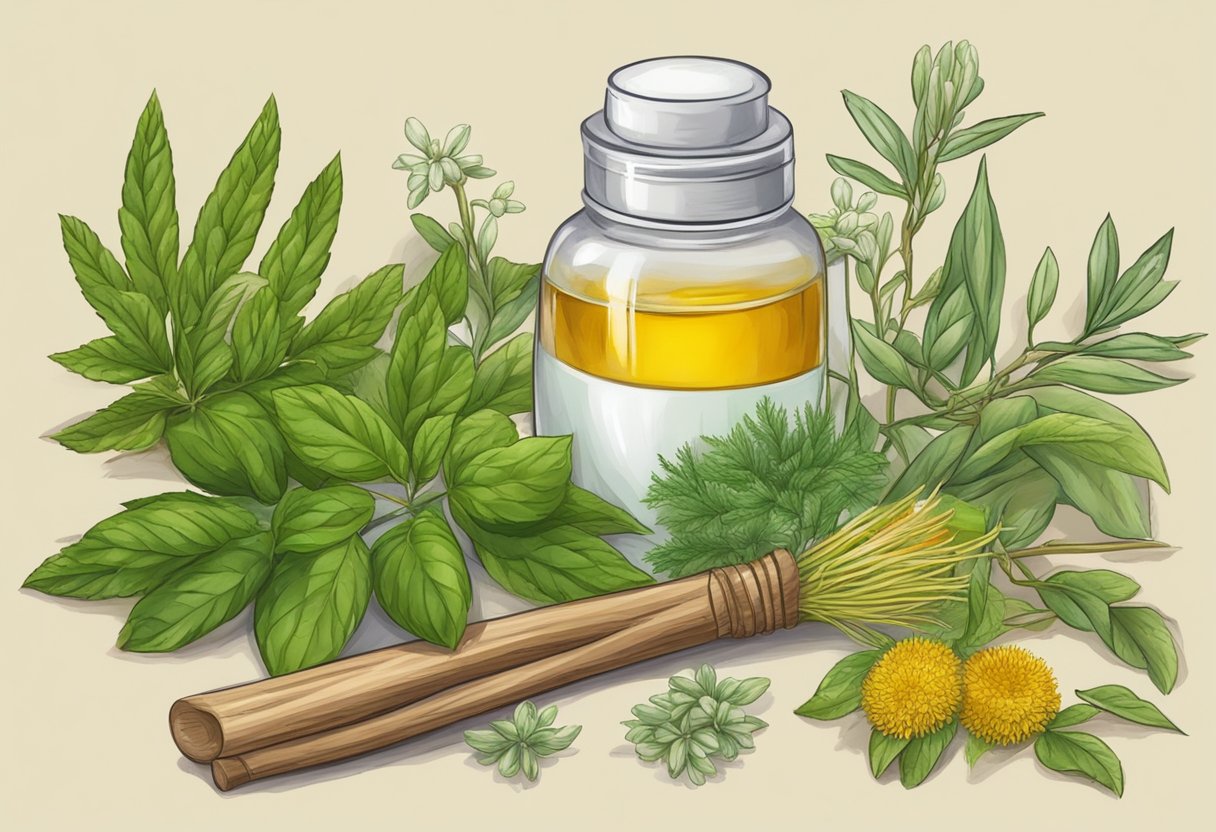Valerian Root for Muscle Spasms: A Natural Remedy Guide
Valerian root has been gaining popularity as a natural remedy for a variety of health issues, including muscle spasms. This herbal supplement is derived from the valerian plant, which has been used for centuries in traditional medicine to alleviate stress, anxiety, and sleep disorders. In recent years, valerian root has been studied for its potential to provide relief for muscle spasms, making it an attractive alternative to conventional muscle relaxants.
Disclaimer: This article is provided for informational purposes only and should not replace professional medical advice. Please consult with a qualified healthcare practitioner or herbalist before using any herbal remedies.
As an antispasmodic agent, valerian root can help suppress muscle spasms and ease the discomfort they cause. This property is particularly beneficial for people who experience muscle cramps and spasms from various conditions, such as sports injuries, menstrual cramps, or chronic pain. Additionally, valerian root’s sedative and calming effects on the nervous system could contribute to its muscle relaxant capabilities.
Incorporating valerian root into one’s wellness routine may provide relief for those seeking a more natural solution to muscle spasms. It’s essential to consult with a healthcare professional before starting any new supplement regimen, particularly if taking other medications or managing pre-existing health conditions.

Understanding Valerian Root
Valerian is a perennial plant native to Europe and North America, primarily known for its therapeutic properties. Extracts from the Valeriana officinalis L. root have sedative and anxiolytic effects, making it a popular herb in traditional medicine.
The root of the Valerian plant contains chemical compounds such as sesquiterpenes and iridoids triesters, which are responsible for its sedative effects. Among these compounds, valerenic acid plays a significant role in creating a calming effect on the user. The strong, distinct smell of the Valerian root is also a key characteristic of this medicinal herb.
Beyond its well-known effects on sleep and anxiety, Valerian root demonstrates muscle relaxant properties. In fact, Valeriana officinalis L. root extracts have shown potential for muscle relaxation, particularly in smooth muscle tissue. While data on the root’s effects on skeletal muscle are limited, some studies suggest that it may provide relief for muscle spasms.
Valerian root’s antispasmodic qualities make it an effective tool for managing pain, particularly in the pelvic area. This can be beneficial in treating discomfort related to menstrual cycle, as the root may help suppress muscle spasms and relieve pain during this period.
In summary, Valerian root is a versatile medicinal herb with an array of therapeutic properties. Its sedative and muscle-relaxant abilities make it a popular choice in traditional medicine, providing relief for those experiencing sleep disorders, anxiety, and muscle-related discomfort.
The Connection Between Valerian Root and Muscle Spasms
Valerian root is a popular herbal remedy known for its potential sedative and calming effects. Among its various benefits, valerian root has been found to provide relief from muscle spasms and cramps. Muscle spasms, also known as muscle cramps, are involuntary contractions of the muscles that can range from mild to severe. They can be caused by factors such as stress, dehydration, or overexertion.
Valerian root’s effectiveness as a muscle relaxer can be attributed to its antispasmodic properties, which means it helps in reducing muscle spasms or cramps in the muscles. The herb functions by affecting the neuromuscular tone, which is the level of tension or resistance to movement in the muscles. Essentially, valerian root helps in calming the nerves and relaxing the muscles, leading to a decrease in the frequency and intensity of muscle spasms.
One of the active compounds found in valerian root is valerenic acid, which is known to interact with the gamma-aminobutyric acid (GABA) receptors in the brain. GABA is a neurotransmitter that plays a crucial role in regulating muscle tone. By increasing the availability of GABA, valerian root can effectively relax muscle tension and provide relief from muscle spasms.
Valerian root is available in various forms such as capsules, tablets, teas, and extracts. It is crucial to follow the recommended dosage instructions provided by the manufacturer or a healthcare provider to ensure safety and effectiveness.
In summary, valerian root’s antispasmodic and neuromuscular-relaxing properties make it a suitable natural remedy for muscle spasms and cramps. However, it is essential to consult a healthcare provider before using valerian root as a treatment for muscle spasms, as individual needs and responses to the herb may vary.
Active Compounds in Valerian Root
Valerian root is known for its potential therapeutic properties, particularly in promoting relaxation and relieving muscle spasms. The efficacy of valerian root is attributed to its active compounds, including valerenic acid, essential oil, and its impact on GABA levels and receptors.
Valerenic acid is one of the key compounds in valerian root responsible for its sedative and muscle-relaxing effects. This compound is found in the root’s essential oil and is known to modulate GABA neurotransmission, allowing it to have a calming effect on the nervous system. The interaction of valerenic acid with GABA receptors is crucial for the muscle-relaxing properties and its potential in alleviating muscle spasms.
The essential oil in the valerian root contains a variety of active compounds, such as valerenic acid, valepotriates, and sesquiterpenes. These compounds contribute to the soothing and calming effects associated with valerian root. The complex composition of essential oil in valerian root may make it a more effective remedy over isolated compounds alone.
Besides valerenic acid, valerian root’s effect on GABA levels is also an important factor in its muscle-relaxing abilities. GABA, or gamma-aminobutyric acid, is a crucial inhibitory neurotransmitter in the nervous system that helps to maintain balance in the muscles and nerves. By increasing the GABA levels, valerian root may help in reducing muscle spasms and promoting relaxation.
Furthermore, valerian root’s interaction with GABA receptors has been shown to enhance the neurotransmitter’s effect on the nervous system. The binding of valerenic acid to GABA receptors plays a critical role in modulating the function of these receptors and providing a downstream calming effect. This interaction can lead to a reduction of muscle spasms and an overall improvement in muscle relaxation.
In conclusion, the effectiveness of valerian root in relieving muscle spasms can be attributed to its active compounds, mainly valerenic acid and essential oil, and its influence on GABA levels and receptors. These factors work collectively to induce relaxation and alleviate muscle tension, making valerian root a potential natural remedy for those suffering from muscle spasms.

The Role of Valerian Root in Muscle Relaxation
Valerian root is a popular herbal supplement known for its numerous health benefits, one of which is its ability to act as a natural muscle relaxer. This perennial plant has been used for centuries to treat a variety of ailments and conditions, including muscle spasms and pain. In this section, we will discuss the role of valerian root in muscle relaxation and how it can be an effective alternative to conventional muscle relaxants.
Valerian root contains various active compounds, including valerenic acids, sesquiterpenes, and valepotriates. These compounds are responsible for the calming and restorative effects that valerian root has on the body’s central nervous system [1]. The presence of valerenic acid and valerenol in valerian root allows it to act on gamma-aminobutyric acid (GABA) receptors in the body [2]. GABA is a neurotransmitter responsible for regulating muscle tone and promoting relaxation.
As a natural muscle relaxer, valerian root can be effective in treating various conditions that involve muscle spasms, such as menstrual cramps and muscle tension due to stress or overexertion. Research suggests that valerian root’s ability to suppress muscle spasms and relieve pain could make it an effective treatment for period pain [3].
When compared to conventional muscle relaxants, valerian root offers a safer, more natural alternative with fewer side effects. Many synthetic muscle relaxants can cause drowsiness, dizziness, or addiction, while valerian root is generally considered safe and non-addictive. However, it is crucial to consult a healthcare professional before using valerian root to treat muscle spasms or other health conditions, as individual reactions and potential interactions with other medications may vary.
The use of valerian root for muscle relaxation provides a natural, effective solution for those seeking relief from muscle spasms and discomfort. By acting on the body’s GABA receptors and promoting a calming effect, valerian root offers an attractive option for those looking for alternative muscle relaxants.
The Synergistic Effect With Other Ingredients
Valerian root has long been known for its sedative and muscle relaxant properties, making it an effective natural remedy for muscle spasms. When combined with other natural ingredients, valerian root’s effectiveness may increase.
One such ingredient is Passiflora, or passionflower, which is commonly used as an herbal remedy for anxiety and sleep disorders. When used in conjunction with valerian root, the calming effects can be enhanced, thus providing relief from muscle spasms.
Studies show that a combination of valerian root extract and passionflower can effectively alleviate muscle tension and promote a sense of relaxation. The typical dosage for valerian root extract is around 450 mg per day, combined with a smaller amount of passionflower extract for optimal results.
Another ingredient to consider is humulus lupulus, also known as hops. Hops are commonly used as a mild sedative and can have a relaxing effect on the central nervous system when combined with valerian root. This pairing may prove beneficial for those suffering from muscle spasms, as it can help calm the nervous system and aid in muscle relaxation.
When combining valerian root extract with humulus lupulus, it is essential to maintain a proper dosage. A typical recommended dose might consist of around 200 mg of valerian root extract and 50 mg of humulus lupulus extract, taken up to two times daily.
It is important to remember that each individual may react differently to various ingredient combinations and dosages. Always consult with a medical professional before starting any new supplement regimen, and be sure to disclose any pre-existing medical conditions or medications being taken to avoid any potential interactions.
In summary, the combination of valerian root extract with ingredients such as passionflower and humulus lupulus may provide a synergistic effect, enhancing the muscle-relaxing properties and offering relief from muscle spasms. This approach can offer a natural and effective alternative to traditional muscle relaxants, without the unwanted side effects often associated with prescription medications.
Pain Management Using Valerian Root

Valerian root has been used as a natural remedy for various ailments for centuries. One of its prominent uses is in helping relieve muscle pain, including leg cramps, low back pain, and shoulder pain. Being confident, knowledgeable, neutral, and clear, this section will explain some reasons why valerian root may be effective in managing muscle related discomforts.
Valerian root is known to have a calming effect which can contribute to its ability to relieve muscle tension. When muscles are relaxed, it is easier for individuals to reduce the intensity of muscle spasms and discomfort. Valerian root also contains compounds that promote a soothing effect on the nervous system. This can be especially helpful when dealing with muscle pain, as it may address both the physical and emotional aspects of discomfort.
Incorporating valerian root into one’s pain management routine can be done through various forms including capsules, teas, and tinctures. Offering different options allows individuals to select the most suitable method for their lifestyle and preferences. Valerian root can usually be taken without any major side effects, making it an appealing alternative to some over-the-counter medications.
Research on the effectiveness of valerian root for pain management is still limited. However, many people have found relief by using this natural remedy. Some sources suggest that valerian root can suppress muscle spasms and relieve pain in conditions such as period pain. It is important to remember that individual experiences may vary and it is always recommended to consult a healthcare professional before adding any new supplements to one’s routine.
To summarize, while more research is needed to confirm the effectiveness of valerian root in muscle pain management, its known calming and soothing properties make it a potential candidate for alleviating muscle tension, including leg cramps, low back pain, and shoulder pain. Remember to consult with a professional before making any changes to your healthcare plan.
Valerian Root as a Health Supplement
Valerian root (Valeriana officinalis) is a popular herbal supplement that has been used for centuries in various regions, including Europe and Asia. It has gained recognition for its potential benefits, especially in the areas of sleep and relaxation. As a dietary supplement, valerian root is often consumed in the form of capsules, tablets, or tinctures.
People seek valerian root supplements for various reasons. A primary use of this herb is as a natural sleep aid, with studies showing its potential to reduce the time it takes to fall asleep and improve sleep quality source. Additionally, valerian root is believed to have a calming effect, making it suitable for individuals experiencing anxiety or nervous tension.
Another potential application of valerian root is its use as a muscle relaxant. It has been suggested that this herbal supplement may help alleviate muscle spasms, providing relief to those suffering from such discomfort source. However, more research is needed to establish its effectiveness in this area.
It’s important to remember that, as with any dietary supplement, the results and individual experiences may vary. While valerian root has demonstrated potential benefits, the research on its full range of effects is still limited, and it may not be effective for everyone. It’s always advised to consult a healthcare professional before starting any new supplement regimen.
In conclusion, valerian root is an intriguing herbal supplement with a long history of use for sleep, relaxation, and potentially muscle pain relief. As a dietary supplement, it offers a natural alternative to conventional treatments, but further research is needed to substantiate its claims and establish optimal usage guidelines.
Potential Side Effects and Precautions
Valerian root is an herbal remedy commonly used to treat muscle spasms and promote relaxation. While it is considered beneficial for some individuals, there are certain side effects and precautions that should be taken into account.
One potential side effect of valerian root use is vivid dreams. These can be disturbing for some users and should be considered before incorporating valerian root into your routine.
In some cases, valerian root may cause headaches, dizziness, skin itching, or digestive upset. Abnormal heart rhythm has also been reported among users of valerian. It’s essential to be aware of these potential side effects and monitor your body’s reaction to the supplement.
In addition, more severe side effects have been reported, such as liver problems, including nausea, upper stomach pain, itching, tiredness, loss of appetite, dark urine, clay-colored stools, and jaundice. While these side effects may be rare, they are important to consider before using valerian root.
To ensure proper drug administration and safety, it’s essential to consult with a healthcare provider before incorporating valerian root into your wellness routine. A professional can help you weigh the potential benefits and risks and provide personalized recommendations based on your specific needs and health history.
Moreover, patients taking medications for sleep, anxiety, or depression should exercise caution when using valerian root, as it may interact with these medications and exacerbate side effects. Pregnant or nursing women should also consult their healthcare provider before using valerian root, as its safety for these populations has not been well-established.
In summary, while valerian root can be a helpful herbal remedy for muscle spasms, it is important to be aware of potential side effects and carefully consider its use. Always consult with a healthcare provider to ensure proper drug administration and individualized guidance on valerian root’s safety and efficacy.
Conclusion: Valerian Root’s Versatility
Valerian root is widely recognized for its natural muscle relaxant properties. Its versatility extends far beyond its ability to alleviate muscle spasms, as it offers numerous benefits for overall health and well-being.
One of the key benefits of Valerian root is its calming effect on the nervous system, which may help reduce anxiety and promote better sleep. This attribute is particularly valuable for individuals seeking natural relief from stress and insomnia.
Moreover, Valerian root has been found to suppress muscle spasms and relieve pain. This property is especially helpful for people who suffer from muscle cramps or those who experience intense pain during menstrual cycles.
In addition to its known muscle-relaxing and sedative properties, Valerian root is prized for its numerous other medicinal benefits. For instance, it is believed to help with digestive problems, heart palpitations, and even headaches.
As with any herbal supplement, it is important to consult a healthcare professional before incorporating Valerian root into one’s routine to ensure a safe and effective experience. Valerian root’s versatility serves as a testament to the power of this ancient herb, providing numerous benefits for those seeking natural relief and improved well-being.







